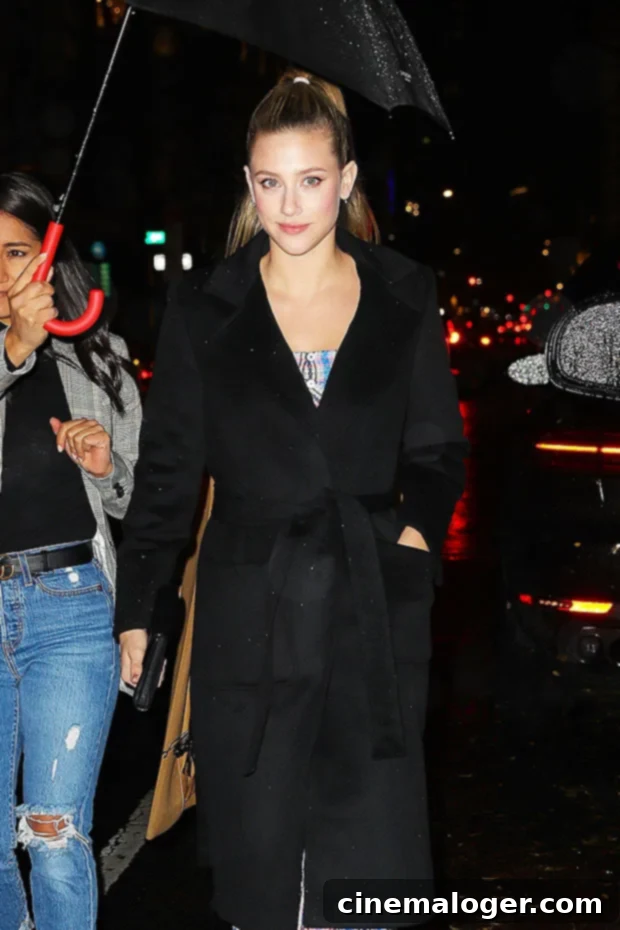Lili Reinhart’s Empowering Journey: From Private Truth to Public Bisexual Icon Amidst Social Activism
In the vibrant world of Hollywood, celebrity voices often resonate far beyond the silver screen, shaping narratives and inspiring millions. Among them, Riverdale star Lili Reinhart has emerged as a beacon of authenticity, particularly concerning her personal journey of self-discovery and sexuality. While her attraction to women was a truth she acknowledged internally from a young age, the path to publicly embracing her bisexual identity was a nuanced one, marked by a thoughtful consideration of public perception and ultimately, empowered by a powerful wave of social justice activism. Her decision to share this personal facet of her life not only added a significant voice to the LGBTQ+ community but also underscored the profound connection between personal identity and collective action.
Lili Reinhart has candidly revealed that her awareness of being attracted to women was not a recent development but a deep-seated understanding that began in her formative years. “I knew full well that I was attracted to women from a young age,” she shared in an August interview with Flaunt magazine. This statement highlights a common experience for many individuals within the LGBTQ+ community – a quiet, internal recognition of one’s sexual orientation long before it is expressed or acknowledged externally. For a public figure navigating the complexities of Hollywood, maintaining such a private truth while being under constant scrutiny presented a unique set of challenges and considerations that ultimately influenced the timing of her public revelation.
The primary reason for Lili’s delayed public announcement stemmed from a valid concern about how her bisexuality might be perceived by the media and the broader public, especially given her past romantic relationships. As she articulated, “I felt that since I’ve exclusively been in hetero-normative relationships, it would be too easy for any outsider, especially the media, to vilify me and accuse me of faking it to get attention.” This fear speaks volumes about the societal prejudices and misunderstandings that bisexual individuals frequently encounter. The notion that one’s sexuality is invalidated or can be “faked” if they have dated partners of a different gender is a harmful stereotype. Lili’s apprehension was a realistic reflection of the skepticism and judgment that often accompany public figures who come out as bisexual, and she wisely chose to protect her personal narrative until the right moment presented itself.
Despite her public silence, Lili’s bisexuality was by no means a secret to those closest to her. She emphasized, “But to my close friends, and those in my life, my bisexuality has been no secret.” This distinction between her private and public life illustrates a common coping mechanism for many LGBTQ+ individuals, particularly those in the public eye. It allows for genuine self-expression and support within a trusted circle, while carefully managing a public persona that might not yet be ready for a full, open disclosure. This dual existence underscores the personal courage required to live authentically, even when aspects of that authenticity must be selectively shared, awaiting a moment of profound empowerment to bridge the gap between private truth and public declaration.

The pivotal moment for Lili’s public coming out arrived on June 3rd, when she chose to reveal her identity via an Instagram Story post. This wasn’t merely a casual announcement; it was a deeply symbolic act inextricably linked to a significant socio-political event: the Black Lives Matter protest in West Hollywood. Her post read, “Although I’ve never announced it publicly before, I am a proud bisexual woman. And I will be joining this protest today. Come join.” By connecting her personal revelation to her participation in a movement advocating for racial justice, Lili highlighted the intersectionality of identities and the powerful role that activism can play in fostering personal courage and collective solidarity. This public declaration served as a testament to her belief in fighting for justice on multiple fronts.
True to her word, Lili Reinhart was indeed spotted protesting in Los Angeles later that same day, actively participating in the Black Lives Matter movement. Photographs captured her wearing a protective face mask and holding a BLM sign, physically embodying the commitment she had just shared with her millions of followers. This visual confirmation of her activism, coupled with her coming out message, resonated powerfully. It conveyed a message of genuine engagement and reinforced that her announcement was not for mere attention, but a sincere expression of who she is and what she stands for. Her actions demonstrated that standing up for one’s own truth can often go hand-in-hand with standing up for the rights and recognition of others, creating a ripple effect of empowerment.

Lili further elaborated on the profound impact the protest had on her decision, telling Flaunt that joining the demonstration was a significant catalyst. “It was incredible to be surrounded by so many people who are actively fighting against the injustices that are happening right now,” she remarked. The palpable energy of collective action, the shared commitment to dismantling systemic injustices, created an environment of solidarity and bravery. In that moment, surrounded by fellow advocates, Lili found the conviction that “Enough is enough,” realizing that the time for silence was over, both for societal wrongs and for her own personal truth. This connection between external activism and internal liberation is a powerful narrative, demonstrating how moments of collective struggle can ignite personal transformation.
Lili Reinhart’s public coming out as bisexual holds immense significance for LGBTQ+ representation in Hollywood and beyond. In an industry where visibility can be both a blessing and a curse, having a mainstream star like Lili openly embrace her bisexuality helps to normalize an often-misunderstood and marginalized identity. Bisexuality, in particular, frequently faces erasure, with individuals often pressured to “pick a side” or having their experiences dismissed as a “phase.” Her unapologetic declaration directly challenges these harmful stereotypes, sending a clear message to countless fans who might be grappling with their own identities that their experiences are valid and worthy of celebration. This kind of authentic representation is crucial for fostering self-acceptance and building a more inclusive media landscape.
The positive reception to Lili’s announcement from her fans and the wider LGBTQ+ community underscored the hunger for genuine and diverse representation. Her courage resonated deeply, inspiring many to share their own stories and reinforcing the idea that authenticity is a powerful force. In a world often characterized by curated personas, Lili’s decision to be vulnerable and open about her identity served as a refreshing reminder of the importance of living truthfully. Her story contributes to a growing dialogue about the spectrum of human sexuality, pushing back against rigid categories and advocating for a more fluid and accepting understanding of love and attraction. This cultural shift, propelled by figures like Lili, is vital for fostering empathy and breaking down barriers.
Moreover, Lili Reinhart’s journey exemplifies how personal narratives can intertwine with broader social movements. Her choice to come out at a Black Lives Matter protest was not accidental; it demonstrated a conscious understanding of intersectionality – the interconnected nature of social categorizations such as race, class, and gender, as they apply to a given individual or group, regarded as creating overlapping and interdependent systems of discrimination or disadvantage. By linking her sexual identity to the fight for racial justice, she powerfully illustrated that the struggle for equality is universal and multifaceted. This act of solidarity amplified both her personal message and the cause she was supporting, showing that fighting for one’s own rights often means fighting for the rights of all.
Looking ahead, Lili Reinhart’s commitment to authenticity and activism suggests a powerful trajectory for her career and public persona. Her willingness to share her vulnerabilities and convictions sets a precedent for how public figures can leverage their platforms for positive change, moving beyond mere entertainment to become genuine advocates. Her impact extends beyond the immediate moment of her coming out; it lays groundwork for ongoing conversations about identity, acceptance, and the responsibilities of celebrity. As society continues to evolve, voices like Lili’s are indispensable in guiding discussions towards greater understanding, compassion, and a more inclusive future for everyone. Her story is a testament to the idea that personal growth and social change are often deeply intertwined, pushing us all towards a more just and equitable world.
